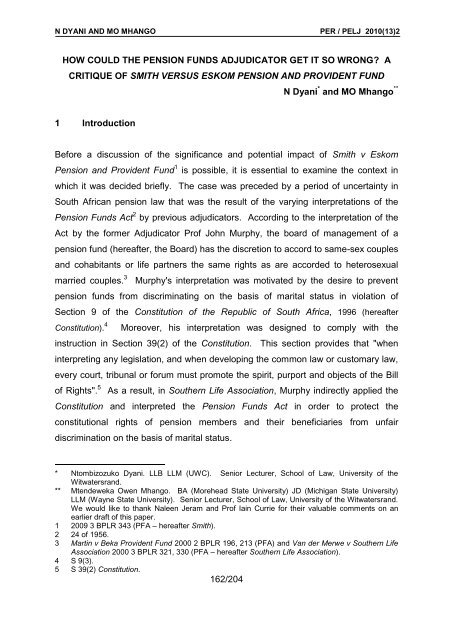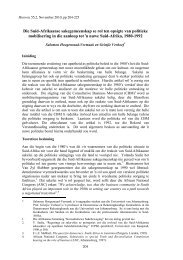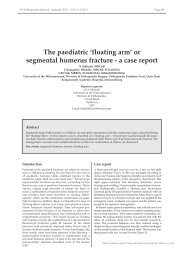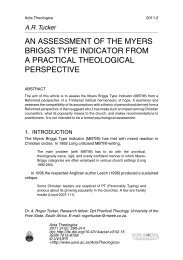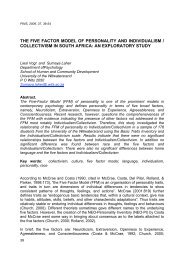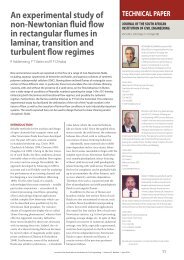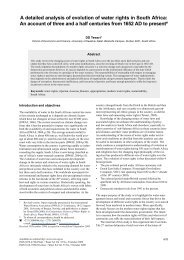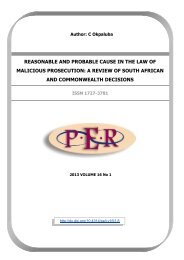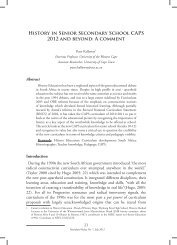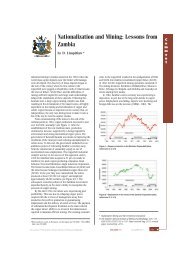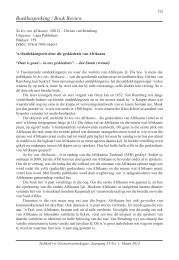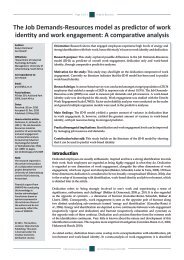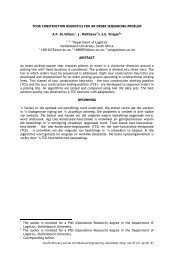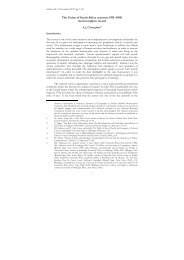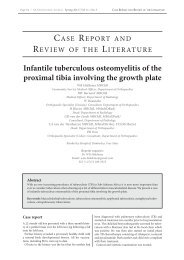how could the pension funds adjudicator get it so wrong
how could the pension funds adjudicator get it so wrong
how could the pension funds adjudicator get it so wrong
Create successful ePaper yourself
Turn your PDF publications into a flip-book with our unique Google optimized e-Paper software.
N DYANI AND MO MHANGO PER / PELJ 2010(13)2<br />
HOW COULD THE PENSION FUNDS ADJUDICATOR GET IT SO WRONG? A<br />
CRITIQUE OF SMITH VERSUS ESKOM PENSION AND PROVIDENT FUND<br />
N Dyani * and MO Mhango **<br />
1 Introduction<br />
Before a discussion of <strong>the</strong> significance and potential impact of Sm<strong>it</strong>h v Eskom<br />
Pension and Provident Fund 1 is possible, <strong>it</strong> is essential to examine <strong>the</strong> context in<br />
which <strong>it</strong> was decided briefly. The case was preceded by a period of uncertainty in<br />
South African <strong>pension</strong> law that was <strong>the</strong> result of <strong>the</strong> varying interpretations of <strong>the</strong><br />
Pension Funds Act 2 by previous <strong>adjudicator</strong>s. According to <strong>the</strong> interpretation of <strong>the</strong><br />
Act by <strong>the</strong> former Adjudicator Prof John Murphy, <strong>the</strong> board of management of a<br />
<strong>pension</strong> fund (hereafter, <strong>the</strong> Board) has <strong>the</strong> discretion to accord to same-sex couples<br />
and cohab<strong>it</strong>ants or life partners <strong>the</strong> same rights as are accorded to heterosexual<br />
married couples. 3 Murphy's interpretation was motivated by <strong>the</strong> desire to prevent<br />
<strong>pension</strong> <strong>funds</strong> from discriminating on <strong>the</strong> basis of mar<strong>it</strong>al status in violation of<br />
Section 9 of <strong>the</strong> Const<strong>it</strong>ution of <strong>the</strong> Republic of South Africa, 1996 (hereafter<br />
Const<strong>it</strong>ution). 4 Moreover, his interpretation was designed to comply w<strong>it</strong>h <strong>the</strong><br />
instruction in Section 39(2) of <strong>the</strong> Const<strong>it</strong>ution. This section provides that "when<br />
interpreting any legislation, and when developing <strong>the</strong> common law or customary law,<br />
every court, tribunal or forum must promote <strong>the</strong> spir<strong>it</strong>, purport and objects of <strong>the</strong> Bill<br />
of Rights". 5 As a result, in Sou<strong>the</strong>rn Life As<strong>so</strong>ciation, Murphy indirectly applied <strong>the</strong><br />
Const<strong>it</strong>ution and interpreted <strong>the</strong> Pension Funds Act in order to protect <strong>the</strong><br />
const<strong>it</strong>utional rights of <strong>pension</strong> members and <strong>the</strong>ir beneficiaries from unfair<br />
discrimination on <strong>the</strong> basis of mar<strong>it</strong>al status.<br />
* Ntombizozuko Dyani. LLB LLM (UWC). Senior Lecturer, School of Law, Univers<strong>it</strong>y of <strong>the</strong><br />
W<strong>it</strong>watersrand.<br />
** Mtendeweka Owen Mhango. BA (Morehead State Univers<strong>it</strong>y) JD (Michigan State Univers<strong>it</strong>y)<br />
LLM (Wayne State Univers<strong>it</strong>y). Senior Lecturer, School of Law, Univers<strong>it</strong>y of <strong>the</strong> W<strong>it</strong>watersrand.<br />
We would like to thank Naleen Jeram and Prof Iain Currie for <strong>the</strong>ir valuable comments on an<br />
earlier draft of this paper.<br />
1 2009 3 BPLR 343 (PFA – hereafter Sm<strong>it</strong>h).<br />
2 24 of 1956.<br />
3 Martin v Beka Provident Fund 2000 2 BPLR 196, 213 (PFA) and Van der Merwe v Sou<strong>the</strong>rn Life<br />
As<strong>so</strong>ciation 2000 3 BPLR 321, 330 (PFA – hereafter Sou<strong>the</strong>rn Life As<strong>so</strong>ciation).<br />
4 S 9(3).<br />
5 S 39(2) Const<strong>it</strong>ution.<br />
162/204
N DYANI AND MO MHANGO PER / PELJ 2010(13)2<br />
However, Murphy's interpretation differed from that of his succes<strong>so</strong>r as Adjudicator,<br />
Vuyani Ngalwana. Ngalwana, following <strong>the</strong> decision in Volks v Robin<strong>so</strong>n, 6 held that<br />
a per<strong>so</strong>n who <strong>could</strong> have married a deceased <strong>pension</strong> member but chose not to,<br />
should not be accorded <strong>the</strong> rights of a spouse of a deceased member. In add<strong>it</strong>ion,<br />
he ruled that in order to qualify as a dependant, <strong>the</strong> surviving cohab<strong>it</strong>ants were to<br />
prove that <strong>the</strong> deceased was <strong>the</strong> dominant financial provider in <strong>the</strong>ir relationship. 7<br />
These conflicting interpretations created uncertainty in <strong>the</strong> law, and <strong>pension</strong> <strong>funds</strong><br />
were unsure of whe<strong>the</strong>r to consider surviving cohab<strong>it</strong>ants as dependants. Many<br />
<strong>pension</strong> <strong>funds</strong> ei<strong>the</strong>r <strong>so</strong>ught clar<strong>it</strong>y from <strong>the</strong> Adjudicator or refused to consider<br />
surviving cohab<strong>it</strong>ants as dependants on <strong>the</strong> author<strong>it</strong>y of Volks and Van der Merwe v<br />
Central Retirement Annu<strong>it</strong>y Fund. 8<br />
In response to this uncertainty and calls from <strong>the</strong> industry and legal commentators 9<br />
for <strong>the</strong> Adjudicator to clarify <strong>the</strong> legal pos<strong>it</strong>ion on cohab<strong>it</strong>ees, <strong>the</strong> next Adjudicator<br />
Mamodupi Mohlala determined Hlathi v Univers<strong>it</strong>y of Fort Hare Retirement Fund. 10<br />
She ruled that a cohab<strong>it</strong>ant qualifies as a factual dependant under <strong>the</strong> Pension<br />
Funds Act provided <strong>it</strong> can be established (by <strong>the</strong> cohab<strong>it</strong>ant) that he/she was in a<br />
permanent relationship of mutual dependency or interdependency, and shared a<br />
common household w<strong>it</strong>h <strong>the</strong> deceased member of <strong>the</strong> <strong>pension</strong> fund. The<br />
determination was welcomed because <strong>it</strong> clarified <strong>the</strong> law and took into account both<br />
Volks and <strong>the</strong> recent amendments to <strong>the</strong> Pension Funds Act. 11 A few months later,<br />
<strong>the</strong> same Adjudicator determined in Sm<strong>it</strong>h that <strong>the</strong> rules of <strong>the</strong> Eskom Fund unfairly<br />
discriminated on <strong>the</strong> basis of mar<strong>it</strong>al status through refusing to pay spouse's death<br />
benef<strong>it</strong>s to <strong>the</strong> complaint because she was not married to <strong>the</strong> deceased.<br />
Fur<strong>the</strong>rmore, since no justification was provided by <strong>the</strong> Eskom Fund, <strong>the</strong> Adjudicator<br />
concluded that <strong>the</strong> rule unfairly breached <strong>the</strong> complainant's const<strong>it</strong>utional rights.<br />
6 Volks v Robin<strong>so</strong>n 2005 5 BCLR 446 (CC) – hereafter Volks.<br />
7 Mar<strong>it</strong>z v Absa Groep Pensioenfonds PFA/GA/1387/00/KM on refusing to grant benef<strong>it</strong>s to<br />
surviving life partners or cohab<strong>it</strong>ants on <strong>the</strong> basis of <strong>the</strong> precedent established in Van der Merwe<br />
v Central Retirement Annu<strong>it</strong>y Fund 2005 5 BPLR 463 (PFA) and Sm<strong>it</strong>h para 13. See De Wilzem<br />
v South African Retirement Annu<strong>it</strong>y Fund 2005 2 BPLR 180 (PFA), in which <strong>the</strong> Adjudicator first<br />
expressed <strong>the</strong> dominant-servient test.<br />
8 2005 5 BPLR 463 (PFA).<br />
9 Mhango 2008 SA Merc LJ 135 (calling on <strong>the</strong> <strong>the</strong>n Adjudicator Mamodupi Mohlala to clarify <strong>the</strong><br />
law in relation to <strong>the</strong> right of cohab<strong>it</strong>ants to qualify as dependants under <strong>the</strong> Pension Funds Act).<br />
10 2009 1 BPLR 46 (PFA) – hereafter Hlathi.<br />
11 Nevondwe 2009 Insurance and Tax Journal. See Dyani Speculum Juris (forthcoming).<br />
163/204
N DYANI AND MO MHANGO PER / PELJ 2010(13)2<br />
It is important to note that w<strong>it</strong>h regard to <strong>the</strong> call by <strong>the</strong> Const<strong>it</strong>utional Court in Volks<br />
for Parliament to regulate cohab<strong>it</strong>ation relationships, 12 <strong>the</strong> Department of Home<br />
Affairs recently issued a Draft Domestic Partnerships Bill 13 for public comment. 14 The<br />
long t<strong>it</strong>le of <strong>the</strong> Draft Bill states <strong>it</strong> is "to provide for <strong>the</strong> legal recogn<strong>it</strong>ion of domestic<br />
partnerships; <strong>the</strong> enforcement of <strong>the</strong> legal consequences of domestic partnerships;<br />
and to provide for matters incidental <strong>the</strong>reto". This Draft Bill provides for both<br />
registered and unregistered partnerships and seeks to provide legal protection to<br />
both. Consequently, Clause 1 defines a 'domestic partnership' as a registered or<br />
unregistered domestic partnership between two per<strong>so</strong>ns who are eighteen years of<br />
age or older. This Draft Bill, if passed, will provide relief to parties in a cohab<strong>it</strong>ation<br />
relationship. However, under <strong>the</strong> current legal regime cohab<strong>it</strong>ants may be left<br />
dest<strong>it</strong>ute at <strong>the</strong> termination of <strong>the</strong> relationship regardless of <strong>the</strong> period of <strong>the</strong>ir<br />
relationship.<br />
In this note, we advance and discuss <strong>the</strong> three main areas in which Sm<strong>it</strong>h should be<br />
regarded as bad law. Firstly, Sm<strong>it</strong>h is inconsistent w<strong>it</strong>h <strong>the</strong> landmark ruling in Volks.<br />
Secondly, <strong>the</strong> Adjudicator ought to have remanded <strong>the</strong> matter in Sm<strong>it</strong>h to <strong>the</strong> Board<br />
and ordered <strong>it</strong> to re-examine <strong>it</strong>s discretion w<strong>it</strong>h a focus on a set of factors. Thirdly,<br />
we outline <strong>so</strong>me of <strong>the</strong> negative effects of Sm<strong>it</strong>h on <strong>the</strong> <strong>pension</strong> <strong>funds</strong> industry.<br />
2 Background of Sm<strong>it</strong>h v Eskom Pension and Provident Fund<br />
12 Volks para 67, 119, 131–143, 239–241.<br />
13 Domestic Partnerships Bill (draft), Notice 36 of 2008, Government Gazette 30663, 14 January<br />
2008. Originally domestic partnerships were included in <strong>the</strong> Civil Union Bill 2006, which was<br />
adopted as a result of <strong>the</strong> Const<strong>it</strong>utional Court decision in Minister of Home Affairs v Fourie;<br />
Lesbian and Gay Equal<strong>it</strong>y Project v Minister of Home Affairs 2006 3 BCLR 355; 2006 1 SA 524<br />
(CC); hereafter Fourie and Lesbian and Gay Equal<strong>it</strong>y Project). The Civil Union Bill had two aims:<br />
first, to provide same-sex couples w<strong>it</strong>h access to a "marriage-like inst<strong>it</strong>ution" called "civil<br />
partnerships"; and second, to extend <strong>so</strong>me financial protection to same-sex and oppos<strong>it</strong>e sex<br />
couples, called domestic partnerships. However, because of <strong>the</strong> pressures of a deadline granted<br />
by <strong>the</strong> Const<strong>it</strong>utional Court, <strong>the</strong> final version of <strong>the</strong> Bill, passed as <strong>the</strong> Civil Union Act 17 of 2006,<br />
om<strong>it</strong>ted all provisions dealing w<strong>it</strong>h domestic partnerships. For fur<strong>the</strong>r discussions on domestic<br />
partnerships, see Clark and Goldblatt "Gender and Family Law" 195. For cr<strong>it</strong>icism of <strong>the</strong> Civil<br />
Union Act, see Bonthuys 2008 SALJ 473; 2008 Sexual<strong>it</strong>ies 726.<br />
14 The due date for comment was 15 February 2008. The draft Bill has yet to be tabled in<br />
Parliament.<br />
164/204
N DYANI AND MO MHANGO PER / PELJ 2010(13)2<br />
In this case, a complaint was brought by Ms Sm<strong>it</strong>h, who was <strong>the</strong> partner of <strong>the</strong> late<br />
Mr EC Labuschagne (<strong>the</strong> deceased), against <strong>the</strong> respondent (<strong>the</strong> Eskom Pension<br />
and Provident Fund – hereafter <strong>the</strong> Eskom Fund). The deceased was an employee<br />
of Eskom and thus became a member of <strong>the</strong> Eskom Fund. When <strong>the</strong> deceased<br />
retired on 30 September 1995, he was ent<strong>it</strong>led to retirement benef<strong>it</strong>s under <strong>the</strong><br />
Eskom Fund rules. While receiving those benef<strong>it</strong>s, he met Ms Sm<strong>it</strong>h in 2002. They<br />
began living toge<strong>the</strong>r as life partners until his death on 29 December 2006.<br />
Following his death, Ms Sm<strong>it</strong>h argued that she had become ent<strong>it</strong>led to spouse's<br />
benef<strong>it</strong>s. Rule 26(3)(a) of <strong>the</strong> Eskom Fund, which regulates <strong>the</strong> payment of spouse's<br />
<strong>pension</strong>, was <strong>the</strong> basis of this alleged ent<strong>it</strong>lement. It provided as follows:<br />
Subject to Section 37C of <strong>the</strong> Pension Funds Act, when a PENSIONER dies,<br />
<strong>the</strong> benef<strong>it</strong> set out in paragraph (a) or (b) below, whichever is payable, shall<br />
be paid:<br />
(a) If a WIDOW or WIDOWER or ELIGIBLE CHILD is left, <strong>the</strong>re shall<br />
be paid to or for such per<strong>so</strong>n:<br />
(i)<br />
(ii)<br />
a lump sum equal to R3000.00; and<br />
a PENSION, <strong>the</strong> amount of which shall at any time be equal<br />
to <strong>the</strong> specified percentage at that time, as set out in this<br />
rule, of <strong>the</strong> PENSIONER'S potential PENSION.<br />
Fur<strong>the</strong>rmore, Rule 26(3)(b) of <strong>the</strong> Eskom Fund provides, "when a <strong>pension</strong>er dies any<br />
benef<strong>it</strong> that arises shall be paid pursuant to section 37C" and "if no widow or<br />
widower or any eligible child is left upon <strong>the</strong> death of a member, any benef<strong>it</strong> that<br />
arises shall be paid to his or her dependant." 15 Fur<strong>the</strong>rmore, <strong>the</strong> rules defined<br />
"widow" or "widower" to mean "a surviving partner of a marriage". "Marriage" was<br />
<strong>the</strong>n defined as follows;<br />
"MARRIAGE" shall mean a MARRIAGE recognized by a South African court<br />
of law and shall include a customary union according to Black law and<br />
custom and a union recognized as a MARRIAGE under <strong>the</strong> tenets of any<br />
Asiatic religion, and a relationship recognized by <strong>the</strong> BOARD as const<strong>it</strong>uting<br />
a MARRIAGE for <strong>the</strong> purposes of <strong>the</strong> application of <strong>the</strong> RULES. 16<br />
When <strong>the</strong> Eskom Fund failed to pay <strong>the</strong> spouse's benef<strong>it</strong>s to Ms Sm<strong>it</strong>h after <strong>the</strong><br />
death of <strong>the</strong> deceased, Ms Sm<strong>it</strong>h brought a complaint, pursuant to Section 30A of<br />
15 Sm<strong>it</strong>h para 9.<br />
16 Sm<strong>it</strong>h para 11.<br />
165/204
N DYANI AND MO MHANGO PER / PELJ 2010(13)2<br />
<strong>the</strong> Pension Funds Act, against <strong>the</strong> Eskom Fund at <strong>the</strong> Office of <strong>the</strong> Pension Funds<br />
Adjudicator.<br />
2.1 The complainant's argument<br />
The complaint was that <strong>the</strong> Eskom Fund unlawfully failed to pay <strong>the</strong> complainant a<br />
spouse's <strong>pension</strong>. The complainant contended that since <strong>the</strong> deceased had been<br />
receiving a monthly <strong>pension</strong> at <strong>the</strong> time of death in terms of Rule 26(3)(a) she was<br />
ent<strong>it</strong>led to a spouse's <strong>pension</strong> upon his death.<br />
2.2 The Eskom Fund argument<br />
The Eskom Fund defended <strong>the</strong> complaint by arguing that <strong>the</strong> complainant <strong>could</strong> only<br />
be ent<strong>it</strong>led to benef<strong>it</strong>s in terms of <strong>the</strong> rule had she been married to <strong>the</strong> deceased.<br />
The Eskom Fund based this argument on <strong>the</strong> reading of Rule 26(3)(b) w<strong>it</strong>h <strong>the</strong><br />
defin<strong>it</strong>ion of "widow" and "marriage" in <strong>the</strong> rules. Ano<strong>the</strong>r argument raised by <strong>the</strong><br />
Eskom Fund was that pursuant to <strong>the</strong> ruling in Volks, <strong>it</strong> was permissible for <strong>the</strong><br />
Eskom Fund to discriminate between married per<strong>so</strong>ns and per<strong>so</strong>ns who had elected<br />
not to marry. Thus, <strong>the</strong> Eskom Fund interpreted Volks to mean that in order to qualify<br />
as a widow under <strong>the</strong> rules, <strong>the</strong> complainant must have been married to <strong>the</strong><br />
deceased, and since she had not been married to <strong>the</strong> deceased <strong>it</strong> was permissible<br />
for <strong>the</strong> Eskom Fund, under <strong>the</strong> author<strong>it</strong>y of Volks, not to recognise her as a widow.<br />
As a result, <strong>the</strong> Eskom Fund, pursuant to Rule 26, paid out R3,000.00 to <strong>the</strong><br />
deceased estate.<br />
Since Rule 26 was subject to Section 37C of <strong>the</strong> Pension Funds Act in <strong>the</strong> sense<br />
that <strong>it</strong> required <strong>the</strong> Eskom Fund to pay benef<strong>it</strong>s to <strong>the</strong> dependants of <strong>the</strong> deceased in<br />
<strong>the</strong> event that he died w<strong>it</strong>hout a widow, Rule 26(4) provided that should a beneficiary<br />
(that is, widow or dependants) die before payment is made to him/her, <strong>the</strong>n payment<br />
of any benef<strong>it</strong>s would have to be made in terms of Section 37C. Thus, <strong>the</strong> Eskom<br />
Fund argued that since <strong>the</strong> complainant was <strong>the</strong> widow of <strong>the</strong> deceased, <strong>the</strong> benef<strong>it</strong><br />
would only be distributed in terms of Section 37C had she passed away before<br />
payment was made. According to <strong>the</strong> Eskom Fund's interpretation of Rule 26(4), a<br />
166/204
N DYANI AND MO MHANGO PER / PELJ 2010(13)2<br />
Section 37C investigation to determine <strong>the</strong> dependants was not required because<br />
<strong>the</strong> complainant was still alive when <strong>it</strong> paid <strong>the</strong> R3,000.00 to <strong>the</strong> deceased estate.<br />
167/204
N DYANI AND MO MHANGO PER / PELJ 2010(13)2<br />
2.3 Rationale and decision<br />
The issue for determination in this matter was whe<strong>the</strong>r <strong>the</strong> complainant was ent<strong>it</strong>led<br />
to a spouse's <strong>pension</strong> in accordance w<strong>it</strong>h <strong>the</strong> rules. The Adjudicator noted that<br />
Section 13 of <strong>the</strong> Pension Funds Act provides that <strong>the</strong> rules of a registered fund shall<br />
be binding on <strong>the</strong> fund, members and any per<strong>so</strong>n who claims under <strong>the</strong> rules. In<br />
add<strong>it</strong>ion, <strong>the</strong> Adjudicator observed <strong>the</strong> decision of <strong>the</strong> Supreme Court of Appeal in<br />
Tek Corporation Provident Fund v Lorentz, 17 which rea<strong>so</strong>ned that "what <strong>the</strong> trustees<br />
may do w<strong>it</strong>h <strong>the</strong> fund's assets is set forth in <strong>the</strong> rules. If what <strong>the</strong>y propose to do (or<br />
have been ordered to do) is not w<strong>it</strong>hin <strong>the</strong> powers conferred upon <strong>the</strong>m by <strong>the</strong> rules,<br />
<strong>the</strong>y may not do <strong>it</strong>". As a result, <strong>the</strong> Adjudicator explained that in order for a<br />
spouse's <strong>pension</strong> to be paid to <strong>the</strong> complainant, she must qualify to receive such<br />
benef<strong>it</strong>s in terms of <strong>the</strong> Eskom Fund rules.<br />
The Adjudicator <strong>the</strong>n c<strong>it</strong>ed Rule 26(3)(a) and noted that while <strong>the</strong> complainant had<br />
not been married to <strong>the</strong> deceased, she and <strong>the</strong> deceased had lived toge<strong>the</strong>r as<br />
husband and wife since 2002. The Adjudicator fur<strong>the</strong>r noted that this was an<br />
increasing practice amongst many South Africans, who chose not to observe <strong>the</strong><br />
formal<strong>it</strong>ies of marriage. The Adjudicator observed that since <strong>the</strong> new const<strong>it</strong>utional<br />
dispensation, courts have widely recognised that <strong>the</strong> privileged treatment of marriage<br />
over o<strong>the</strong>r forms of life partnerships is unfair, pursuant to <strong>the</strong> equal<strong>it</strong>y provisions of<br />
<strong>the</strong> Const<strong>it</strong>ution. According to <strong>the</strong> Adjudicator, o<strong>the</strong>r rulings by <strong>the</strong> Const<strong>it</strong>utional<br />
Court have recognised that <strong>the</strong>re are different forms of life partnerships and that<br />
marriage represents but one form of life partnership recognised by <strong>the</strong> courts. 18<br />
In order to explain <strong>the</strong> problem of cohab<strong>it</strong>ants and <strong>the</strong> recogn<strong>it</strong>ion of domestic<br />
partnerships as const<strong>it</strong>uting a common form of family arrangement in South Africa,<br />
<strong>the</strong> Adjudicator c<strong>it</strong>ed Goldblatt:<br />
Courts may say, in response to heterosexual cohab<strong>it</strong>ants that <strong>the</strong>y choose<br />
not to marry and cannot ask for assistance from <strong>the</strong> courts once <strong>the</strong>y<br />
exercise this choice. One response to this is that a 'choice' must be<br />
17 2000 3 BPLR 227 (PFA; hereafter Tek Corporation Provident Fund).<br />
18 Satchwell v President of <strong>the</strong> RSA 2002 (9) BCLR 986; 2002 6 SA 1 (CC).<br />
168/204
N DYANI AND MO MHANGO PER / PELJ 2010(13)2<br />
understood contextually. In South Africa, gender inequal<strong>it</strong>y,<br />
disempowerment of women, poverty and ignorance of <strong>the</strong> law all contribute<br />
towards removing real choice from many people especially poor women. 19<br />
In light of this problem, <strong>the</strong> Adjudicator expressly advocated for <strong>the</strong> protection of <strong>the</strong><br />
rights of women and said:<br />
In s<strong>it</strong>uations involving life partners a court should, inter alia, consider<br />
whe<strong>the</strong>r <strong>the</strong> parties have s<strong>how</strong>n <strong>the</strong>ir comm<strong>it</strong>ment to a shared household,<br />
and <strong>the</strong> existence of a significant period of cohab<strong>it</strong>ation, <strong>the</strong> nature of<br />
financial and o<strong>the</strong>r dependency between <strong>the</strong> parties including significant<br />
mutual financial support in respect of <strong>the</strong> household. 20<br />
In <strong>the</strong> final analysis, <strong>the</strong> Adjudicator determined that <strong>the</strong> <strong>so</strong>le rea<strong>so</strong>n <strong>the</strong> complainant<br />
was not paid <strong>the</strong> spouse's <strong>pension</strong> pursuant to Rule 26(3)(a) was that she had not<br />
been married to <strong>the</strong> deceased. This amounted to unfair discrimination on <strong>the</strong> basis of<br />
mar<strong>it</strong>al status, and since no justification was provided by <strong>the</strong> Eskom Fund, <strong>the</strong><br />
Adjudicator concluded that <strong>the</strong> complainant's const<strong>it</strong>utional rights had been unfairly<br />
restricted. As a result, <strong>the</strong> Adjudicator ordered <strong>the</strong> Eskom Fund to pay <strong>the</strong><br />
complainant <strong>the</strong> spouse's <strong>pension</strong> in accordance w<strong>it</strong>h Rule 26(3)(a).<br />
3 Discussion<br />
3.1 Sm<strong>it</strong>h is inconsistent w<strong>it</strong>h <strong>the</strong> Const<strong>it</strong>utional Court decision in Volks<br />
In a landmark decision in Volks, <strong>the</strong> Const<strong>it</strong>utional Court held that <strong>it</strong> was<br />
const<strong>it</strong>utionally permissible for <strong>the</strong> Maintenance of Surviving Spouses Act 21 to<br />
discriminate on <strong>the</strong> basis of mar<strong>it</strong>al status in <strong>the</strong> provision of maintenance benef<strong>it</strong>s. It<br />
was not an infringement of <strong>the</strong> Const<strong>it</strong>ution for <strong>the</strong> Act, which confined <strong>it</strong>s benef<strong>it</strong>s to<br />
married per<strong>so</strong>ns, not to accord a benef<strong>it</strong> to <strong>the</strong> plaintiff if <strong>the</strong> plaintiff was a cohab<strong>it</strong>ant<br />
who <strong>could</strong> have married <strong>the</strong> deceased but chose not to. As a result, Volks<br />
established that <strong>it</strong> is const<strong>it</strong>utionally permissible for an act of Parliament to<br />
19 Sm<strong>it</strong>h para 23, c<strong>it</strong>ing Goldblatt 2003 SALJ 610.<br />
20 Sm<strong>it</strong>h at para 24. Even though not acknowledged, <strong>the</strong>se factors were borrowed from <strong>the</strong><br />
dissenting judgment in Nova Scotia (Attorney General) v Walsh 2002 SCC 83 (hereafter Nova<br />
Scotia).<br />
21 27 of 1990.<br />
169/204
N DYANI AND MO MHANGO PER / PELJ 2010(13)2<br />
discriminate against a cohab<strong>it</strong>ant on <strong>the</strong> basis of mar<strong>it</strong>al status. It is important to<br />
emphasise that Sm<strong>it</strong>h is similar to Volks in <strong>the</strong> sense that <strong>the</strong> complainants in both<br />
matters <strong>so</strong>ught to be recognised as spouses although <strong>the</strong>y had not been married to<br />
<strong>the</strong>ir deceased partners. Since <strong>the</strong> court in Volks found that <strong>the</strong> discrimination was<br />
permissible, we find <strong>it</strong> inconceivable that <strong>the</strong> Adjudicator in Sm<strong>it</strong>h would hold<br />
o<strong>the</strong>rwise when faced w<strong>it</strong>h a similar question in <strong>the</strong> context of a registered <strong>pension</strong><br />
fund rule.<br />
If <strong>the</strong> highest court of <strong>the</strong> Republic on const<strong>it</strong>utional matters held that <strong>it</strong> is<br />
const<strong>it</strong>utionally permissible for Parliament to discriminate on <strong>the</strong> basis of mar<strong>it</strong>al<br />
status, why would <strong>it</strong> be repugnant to <strong>the</strong> Const<strong>it</strong>ution for a <strong>pension</strong> fund to do <strong>the</strong><br />
same thing? After all a registered <strong>pension</strong> fund rule is not a law of general<br />
application and, being lower in <strong>the</strong> legal hierarchy of rules governing South African<br />
<strong>so</strong>ciety, is not subject to <strong>the</strong> same rigid const<strong>it</strong>utional scrutiny required of an act of<br />
Parliament. If such an act of Parliament is deemed const<strong>it</strong>utional in <strong>the</strong> case in which<br />
<strong>it</strong> discriminates on <strong>the</strong> basis of mar<strong>it</strong>al status, surely <strong>the</strong> same would be ruled in <strong>the</strong><br />
case of a registered <strong>pension</strong> fund rule that discriminated on <strong>the</strong> same basis.<br />
Moreover, <strong>the</strong> determination in Sm<strong>it</strong>h was not supported by convincing arguments.<br />
Recall that <strong>the</strong> Adjudicator was concerned w<strong>it</strong>h gender inequal<strong>it</strong>y and imbalances in<br />
South African law in relation to women cohab<strong>it</strong>ants. 22 The Adjudicator al<strong>so</strong> observed<br />
that since <strong>the</strong> new const<strong>it</strong>utional order, courts have widely recognised that <strong>the</strong><br />
privileged treatment of marriage is unfair under <strong>the</strong> equal<strong>it</strong>y provisions of <strong>the</strong><br />
Const<strong>it</strong>ution. In order to support her arguments and conclusion, <strong>the</strong> Adjudicator<br />
observed that <strong>the</strong> rulings of <strong>the</strong> Const<strong>it</strong>utional Court, w<strong>it</strong>hout referring to specific<br />
case law, recognise all forms of life partnerships, including marriage. Our<br />
assumption is that <strong>the</strong> Adjudicator was referring to Dawood v Minister of Home<br />
Affairs, 23 Fourie and Lesbian and Gay Equal<strong>it</strong>y Project, 24 in which <strong>the</strong>se sentiments<br />
were expressed.<br />
22 Sm<strong>it</strong>h at para 23, c<strong>it</strong>ing Goldblatt (n 19) 619. Note that Goldblatt made her arguments and<br />
observations in light of Justice L'Heureux-Dube's dissenting judgment in Nova Scotia. As noted<br />
in <strong>the</strong> paper, <strong>the</strong> South African Parliament has proposed a draft Domestic Partnerships Bill to<br />
regulate cohab<strong>it</strong>ation arrangement and address <strong>so</strong>me of <strong>the</strong> concerns noted by <strong>the</strong> Adjudicator in<br />
Sm<strong>it</strong>h.<br />
23 2000 8 BCLR 837; 2000 3 SA 936 (CC) para 31:<br />
170/204
N DYANI AND MO MHANGO PER / PELJ 2010(13)2<br />
While <strong>the</strong>se arguments and rea<strong>so</strong>ns are persuasive in <strong>the</strong>ir own right, <strong>the</strong>y were<br />
dissenting judgments in Volks 25 and in Nova Scotia, a case that indirectly influenced<br />
<strong>the</strong> Adjudicator's decision. More importantly, <strong>the</strong>se arguments were expressed by<br />
Davis J in <strong>the</strong> High Court decision in Robin<strong>so</strong>n v Volks 26 and were rejected by <strong>the</strong><br />
major<strong>it</strong>y in Volks. As a result, we maintain that <strong>the</strong>re was no valid legal basis in<br />
Sm<strong>it</strong>h to rule against <strong>the</strong> Eskom Fund, ra<strong>the</strong>r <strong>the</strong> Adjudicator was concerned w<strong>it</strong>h<br />
addressing <strong>the</strong> plight of women in <strong>the</strong> complainant's s<strong>it</strong>uation. This cannot be a legal<br />
basis upon which to invalidate a decision by <strong>the</strong> Board made in accordance w<strong>it</strong>h <strong>the</strong><br />
rules. 27 Of particular concern is that <strong>the</strong> Adjudicator relied on a High Court decision<br />
that was overruled by <strong>the</strong> Const<strong>it</strong>utional Court. Moreover, in Sm<strong>it</strong>h <strong>the</strong>re is not a<br />
single acknowledgement of <strong>the</strong> Const<strong>it</strong>utional Court decision in Volks, yet in Hlathi,<br />
which was decided five months before Sm<strong>it</strong>h on a similar question, <strong>the</strong> Const<strong>it</strong>utional<br />
Court decision in Volks was referred to numerous times. What is more, <strong>the</strong> Board of<br />
<strong>the</strong> Eskom Fund c<strong>it</strong>ed Volks as <strong>it</strong>s author<strong>it</strong>y for denying benef<strong>it</strong>s to <strong>the</strong> complainant.<br />
Therefore, <strong>it</strong> is our considered view that Sm<strong>it</strong>h was <strong>wrong</strong>ly decided and should be<br />
rejected as bad law.<br />
3.2 The matter ought to have been remanded to <strong>the</strong> Board<br />
In Sm<strong>it</strong>h <strong>the</strong> Adjudicator unlawfully exceeded her author<strong>it</strong>y when she ordered <strong>the</strong><br />
Board to pay <strong>the</strong> complainant <strong>the</strong> spouse's <strong>pension</strong> in accordance w<strong>it</strong>h<br />
Rule 26(3)(a). It is our contention that <strong>the</strong> Adjudicator <strong>could</strong> have arrived at <strong>the</strong><br />
same outcome w<strong>it</strong>hout exceeding her powers and <strong>could</strong> have avoided <strong>the</strong><br />
The inst<strong>it</strong>ution of marriage and <strong>the</strong> family are important <strong>so</strong>cial inst<strong>it</strong>utions that provide for <strong>the</strong><br />
secur<strong>it</strong>y, support and companionship of our <strong>so</strong>ciety and bear an important role in <strong>the</strong> rearing<br />
of children. … However, families come in many shapes and sizes. The defin<strong>it</strong>ion of <strong>the</strong><br />
family al<strong>so</strong> changes as <strong>so</strong>cial practices and trad<strong>it</strong>ions change. In recognising <strong>the</strong> importance<br />
of <strong>the</strong> family, we must take care not to entrench particular forms of family at <strong>the</strong> expense of<br />
o<strong>the</strong>r forms.<br />
24 Fourie and Lesbian and Gay Equal<strong>it</strong>y Project para 98:<br />
The const<strong>it</strong>utional claims of same-sex couples can accordingly not be negated by invoking<br />
<strong>the</strong> rights of believers to have <strong>the</strong>ir religious freedom respected. The two sets of interests<br />
involved do not collide, <strong>the</strong>y co-exist in a const<strong>it</strong>utional realm based on accommodation of<br />
divers<strong>it</strong>y.<br />
25 Volks para 98–145 Mokgoro and O'Regan (dissenting) and para 146–242 Sachs (dissenting).<br />
26 Robin<strong>so</strong>n v Volks 2004 6 BCLR 671 (C); 2004 6 SA 288 (C; hereafter Robin<strong>so</strong>n).<br />
27 See Tek Corporation Provident Fund 898G–899A (n 17), which held that trustees are only<br />
empowered to act in accordance w<strong>it</strong>h <strong>the</strong> rules of <strong>the</strong> fund; Abrahamse v Connock's Pension<br />
Fund 1963 2 SA 76 (W) 78 D–E, which held that <strong>the</strong> rules const<strong>it</strong>ute <strong>the</strong> const<strong>it</strong>ution of <strong>the</strong> fund.<br />
171/204
N DYANI AND MO MHANGO PER / PELJ 2010(13)2<br />
const<strong>it</strong>utional question. 28 Previously, <strong>the</strong> Adjudicator has consistently held that as a<br />
reviewing tribunal, her duty is not to decide upon <strong>the</strong> fairest or most generous<br />
distribution but to determine whe<strong>the</strong>r <strong>the</strong> Board has acted rationally and arrived at a<br />
proper and lawful decision. 29 For example, in Van der Linde v Telkom Retirement<br />
Fund 30 <strong>the</strong> Adjudicator had to determine <strong>the</strong> cr<strong>it</strong>eria to be fulfilled when a <strong>pension</strong><br />
fund makes eligibil<strong>it</strong>y of a member for permanent disabil<strong>it</strong>y benef<strong>it</strong>s cond<strong>it</strong>ional upon<br />
an insurance company accepting a disabil<strong>it</strong>y claim from <strong>the</strong> <strong>pension</strong> fund under a reinsurance<br />
policy, and whe<strong>the</strong>r <strong>the</strong> Board properly exercised <strong>it</strong>s discretion when <strong>it</strong><br />
repudiated <strong>the</strong> complainant's disabil<strong>it</strong>y application. In re<strong>so</strong>lving <strong>the</strong> issue concerned,<br />
<strong>the</strong> Adjudicator emphasised that <strong>the</strong> rules of <strong>the</strong> <strong>pension</strong> fund gave <strong>the</strong> Board two<br />
distinct sets of discretionary powers. The first was <strong>the</strong> discretion to decide whe<strong>the</strong>r a<br />
member is permanently disabled for purposes of rule 1.15. The Adjudicator <strong>the</strong>n<br />
qualified this discretionary power and ruled that <strong>the</strong> Board must exercise <strong>it</strong><br />
independently of <strong>the</strong> insurer w<strong>it</strong>h whom <strong>the</strong> disabil<strong>it</strong>y benef<strong>it</strong>s have been re-insured.<br />
The second was <strong>the</strong> discretion to make payment, in whole or in part, of any benef<strong>it</strong> in<br />
cases in which <strong>the</strong> insurer has refused ei<strong>the</strong>r to adm<strong>it</strong> a claim or to pay <strong>the</strong> claim in<br />
<strong>it</strong>s entirety. The Adjudicator ruled that in exercising this discretion, <strong>the</strong> Board must<br />
consider all relevant factors. One such factor is <strong>the</strong> <strong>so</strong>undness of <strong>the</strong> reserve<br />
account in <strong>the</strong> <strong>pension</strong> fund. Fur<strong>the</strong>rmore, <strong>the</strong> Adjudicator noted that in certain<br />
s<strong>it</strong>uations <strong>it</strong> <strong>could</strong> be that for rea<strong>so</strong>ns of equ<strong>it</strong>y and fairness, a benef<strong>it</strong> is paid out or<br />
topped up in a case in which <strong>the</strong> insurer has repudiated because of a technical<strong>it</strong>y, or<br />
o<strong>the</strong>rwise in a case in which <strong>the</strong> facts call for an exercise of <strong>the</strong> discretion in favour<br />
28 While we advocate for tribunals such as <strong>the</strong> Office of <strong>the</strong> Pension Funds Adjudicator to interpret<br />
and apply <strong>the</strong> Const<strong>it</strong>ution because <strong>it</strong> will streng<strong>the</strong>n <strong>the</strong> impact of <strong>the</strong> Const<strong>it</strong>ution in our <strong>so</strong>ciety,<br />
in light of Sm<strong>it</strong>h we suggest that tribunals should not hes<strong>it</strong>ate to employ <strong>the</strong> doctrine of avoidance<br />
where appropriate. This doctrine holds that "where <strong>it</strong> is possible to decide any case, civil or<br />
criminal, w<strong>it</strong>hout reaching a const<strong>it</strong>utional issue that is <strong>the</strong> course which should be followed". For<br />
a discussion of <strong>the</strong> doctrine of avoidance that may have been employed by <strong>the</strong> Adjudicator, see<br />
S v Mhlungu 1995 3 SA 867 (CC) para 59 and Zantsi v Council of State, Ciskei 1995 4 SA 615<br />
(CC) para 2–8 (affirming <strong>the</strong> doctrine of avoidance). See al<strong>so</strong> Currie and De Waal Bill of Rights<br />
Handbook 75–78 (on <strong>the</strong> rea<strong>so</strong>ns for observing <strong>the</strong> doctrine of avoidance arguing that courts<br />
should avoid making pronouncements on <strong>the</strong> meaning of <strong>the</strong> Const<strong>it</strong>ution where <strong>it</strong> is not<br />
necessary to do <strong>so</strong>, in order to perm<strong>it</strong> <strong>the</strong> legislature to reform <strong>the</strong> law in accordance w<strong>it</strong>h <strong>it</strong>s own<br />
interpretation of <strong>the</strong> Const<strong>it</strong>ution).<br />
29 D<strong>it</strong>shabe v Sanlam Marketers Retirement Fund 2 2001 10 BPLR 2579 (PFA) 2582 and H v<br />
Bidcorp Provident Fund 2008 1 BPLR 19 (PFA; hereafter H-case); cf. Gowing v Lifestyle<br />
Retirement Annu<strong>it</strong>y Fund 2007 2 BPLR 212 (PFA; hereafter Gowing) – overturning <strong>the</strong> Board's<br />
decision.<br />
30 Van der Linde v Telkom Retirement Fund 2004 11 BPLR 6257 (PFA) 6259 (hereafter Van der<br />
Linde). See Mhango 2007 ILJ 1472 for a cr<strong>it</strong>ical discussion of Van der Linde.<br />
172/204
N DYANI AND MO MHANGO PER / PELJ 2010(13)2<br />
of making <strong>the</strong> payment. 31 In <strong>the</strong> final analysis, <strong>the</strong> Adjudicator set aside <strong>the</strong> Board's<br />
decision to repudiate <strong>the</strong> claim for disabil<strong>it</strong>y benef<strong>it</strong>s in terms of <strong>the</strong> rules and ordered<br />
<strong>the</strong> Board to reconsider <strong>it</strong>s decision by taking into consideration all relevant facts and<br />
to exercise <strong>the</strong> discretion conferred on <strong>it</strong> by rules 9.3(1) 32 and 1.15. In add<strong>it</strong>ion, <strong>the</strong><br />
Adjudicator ordered that, in <strong>the</strong> exercise of <strong>it</strong>s discretion, <strong>the</strong> Board had to take into<br />
account factors such as <strong>the</strong> complainant's employment history, medical reports<br />
subm<strong>it</strong>ted by <strong>the</strong> complainant and <strong>the</strong> financial pos<strong>it</strong>ion of <strong>the</strong> <strong>pension</strong> fund.<br />
In <strong>the</strong> same way, <strong>the</strong> Adjudicator in <strong>the</strong> context of Sm<strong>it</strong>h ought to have taken <strong>the</strong><br />
approach in Van der Linde and determined whe<strong>the</strong>r <strong>the</strong> rules of <strong>the</strong> Eskom Fund<br />
granted <strong>the</strong> Board any discretionary powers. Had <strong>the</strong> Adjudicator done this, she<br />
would have ascertained that in <strong>the</strong> rules' defin<strong>it</strong>ion of marriage <strong>the</strong> Board was<br />
entrusted w<strong>it</strong>h <strong>the</strong> discretion to recognise any relationship as const<strong>it</strong>uting a marriage<br />
for <strong>the</strong> purposes of <strong>the</strong> application of <strong>the</strong> rules. Therefore, in order to ensure that <strong>the</strong><br />
Board reached a proper and lawful decision, <strong>the</strong> Adjudicator ought to have<br />
remanded <strong>the</strong> matter to <strong>the</strong> Board of <strong>the</strong> Eskom Fund, ordering <strong>it</strong> to exercise <strong>it</strong>s<br />
discretionary powers under <strong>the</strong> rules, taking into account relevant factors specific to<br />
<strong>the</strong> case such as gender inequal<strong>it</strong>y, disempowerment of women in South Africa, <strong>the</strong><br />
comm<strong>it</strong>ment of <strong>the</strong> parties to a shared household, <strong>the</strong> existence of a significant<br />
period of cohab<strong>it</strong>ation, <strong>the</strong> nature of financial and o<strong>the</strong>r dependency between <strong>the</strong><br />
parties, including significant mutual financial support in respect of <strong>the</strong> household. 33<br />
Such an order may have ensured a similar outcome w<strong>it</strong>hout <strong>the</strong> resulting difficulties.<br />
Moreover, failure to adhere to <strong>it</strong>s precedent and approach in Van der Linde and o<strong>the</strong>r<br />
cases 34 led <strong>the</strong> Adjudicator to exceed her powers. As <strong>the</strong> Adjudicator observed in<br />
Gowing: 35<br />
31 Van der Linde 6262.<br />
32 This rule provided, in pertinent part, that:<br />
<strong>the</strong> trustees may in <strong>the</strong>ir ab<strong>so</strong>lute discretion make provision for payment out of <strong>the</strong> reserve<br />
account of part of any benef<strong>it</strong> which has been reduced or for payment of <strong>the</strong> whole benef<strong>it</strong>,<br />
where <strong>the</strong> insurer has refused to adm<strong>it</strong> a claim in respect of any benef<strong>it</strong>.<br />
33 Note that <strong>the</strong>se factors, which <strong>the</strong> Adjudicator listed in Sm<strong>it</strong>h were mentioned by Davis J in<br />
Robin<strong>so</strong>n and <strong>the</strong> dissenting judgment by Justice L'Heureux-Dube in Nova Scotia 681.<br />
34 See Marion v Avusa Lim<strong>it</strong>ed Pension Fund 2009 1 BPLR 63 (PFA), in which <strong>the</strong> Adjudicator<br />
remanded <strong>the</strong> matter to <strong>the</strong> Board to recalculate benef<strong>it</strong>s in terms of <strong>the</strong> rules; Hildebrand v<br />
Telkom Retirement Fund 2005 5 BPLR 405 (PFA), in which <strong>the</strong> Adjudicator remanded <strong>the</strong> matter<br />
to <strong>the</strong> Board to exercise discretion properly; H-case, in which <strong>the</strong> Adjudicator held that <strong>the</strong> Board<br />
173/204
N DYANI AND MO MHANGO PER / PELJ 2010(13)2<br />
"courts and tribunals are wary of assuming a discretion entrusted to ano<strong>the</strong>r<br />
functionary, and will refer <strong>the</strong> matter back to that functionary for a fresh<br />
decision. However, this principle may be departed from in exceptional<br />
circumstances, where for instance:<br />
(a)<br />
(b)<br />
(c)<br />
(d)<br />
<strong>the</strong> end result is in any event a foregone conclusion, and <strong>it</strong> would<br />
merely be a waste of time to order <strong>the</strong> tribunal or functionary to<br />
reconsider <strong>the</strong> matter;<br />
fur<strong>the</strong>r delay would cause unjustifiable prejudice to <strong>the</strong> applicant;<br />
<strong>the</strong> tribunal or functionary has exhib<strong>it</strong>ed bias or incompetence to<br />
such a degree that <strong>it</strong> would be unfair to require <strong>the</strong> applicant to<br />
subm<strong>it</strong> to <strong>the</strong> same jurisdiction again; and<br />
<strong>the</strong> Court is in as good a pos<strong>it</strong>ion to make <strong>the</strong> decision <strong>it</strong>self.<br />
The rationale for <strong>the</strong> above principle is to allow <strong>the</strong> functionary freedom to exercise<br />
<strong>it</strong>s discretion. It is evident that in Sm<strong>it</strong>h <strong>the</strong> Adjudicator did not satisfy herself that <strong>the</strong><br />
Board had failed or would fail to do <strong>so</strong>. Fur<strong>the</strong>rmore, <strong>the</strong> facts of <strong>the</strong> case when<br />
considered in light of <strong>the</strong> above did not justify departure from <strong>the</strong> principle for various<br />
rea<strong>so</strong>ns. Firstly, <strong>the</strong> end result was not a foregone conclusion, and thus <strong>the</strong> Board<br />
<strong>could</strong> fru<strong>it</strong>fully have reconsidered <strong>the</strong> matter taking into account <strong>the</strong> suggested<br />
relevant factors. The Board may have been unaware that <strong>it</strong> enjoyed a discretionary<br />
power w<strong>it</strong>hin <strong>the</strong> rules that allowed <strong>it</strong> to recognise a relationship as a marriage for<br />
purposes of <strong>the</strong> application of <strong>the</strong> rules. Surely, this s<strong>it</strong>uation <strong>could</strong> not warrant a<br />
conclusion that <strong>it</strong> was a foregone conclusion or waste of time to order a<br />
reconsideration of <strong>the</strong> matter. Moreover, since <strong>the</strong> matter in Sm<strong>it</strong>h had been lodged,<br />
<strong>the</strong> Pension Funds Act was amended w<strong>it</strong>h regard to <strong>the</strong> defin<strong>it</strong>ion of "spouse" 36 and<br />
Hlathi had been decided. These developments may al<strong>so</strong> have been pointed out as<br />
relevant factors in <strong>the</strong> Board's reconsideration of <strong>the</strong> matter.<br />
Secondly, fur<strong>the</strong>r delay would not have caused unjustifiable prejudice to <strong>the</strong><br />
complainant because <strong>the</strong> Board would have had to be given <strong>so</strong>me direction and a<br />
deadline for reconsidering <strong>the</strong> matter, as was done in Van der Linde.<br />
fettered <strong>it</strong>s discretion, resulting in <strong>the</strong> matter being remanded; and Barry v Standard Bank Group<br />
Retirement Fund 2005 3 BPLR 242 (PFA), in which <strong>the</strong> Adjudicator held that <strong>the</strong> Board's decision<br />
was unrea<strong>so</strong>nable and remanded <strong>the</strong> matter for reconsideration.<br />
35 Gowing (n 29) para 9.1.<br />
36 S 1(u) of <strong>the</strong> Pension Funds Amendment Act 11 of 2007.<br />
174/204
N DYANI AND MO MHANGO PER / PELJ 2010(13)2<br />
Thirdly, <strong>the</strong> Board did not exhib<strong>it</strong> bias or incompetence to such a degree that <strong>it</strong> would<br />
have been unfair to require <strong>the</strong> complainant to subm<strong>it</strong> to <strong>the</strong> same functionary again.<br />
If anything, <strong>the</strong> Board may have been affected by <strong>the</strong> uncertainty that had prevailed<br />
since Volks and decided to repudiate <strong>the</strong> claim by <strong>the</strong> complainant on this basis. In<br />
fact, one of <strong>the</strong> arguments raised by <strong>the</strong> Eskom Fund was that pursuant to Volks <strong>it</strong><br />
was permissible for <strong>the</strong> Eskom Fund to discriminate on <strong>the</strong> basis of mar<strong>it</strong>al status<br />
because such discrimination is fair and const<strong>it</strong>utional. This means that <strong>the</strong><br />
repudiation of <strong>the</strong> claim may not be attributed to any bias or incompetence but to a<br />
potential misinterpretation of <strong>the</strong> law and rules of <strong>the</strong> fund coupled w<strong>it</strong>h <strong>the</strong><br />
uncertainty of <strong>the</strong> law at <strong>the</strong> time, which Sm<strong>it</strong>h does nothing to re<strong>so</strong>lve. It appears<br />
that <strong>the</strong> Board's major error was that <strong>the</strong>y focused on Volks w<strong>it</strong>hout giving adequate<br />
regard to <strong>the</strong> discretionary power granted to <strong>the</strong>m in <strong>the</strong> rules. While <strong>the</strong>y may have<br />
read Volks correctly, <strong>the</strong>y applied <strong>it</strong> incorrectly in light of <strong>the</strong> discretionary power <strong>the</strong>y<br />
enjoyed under <strong>the</strong> rules.<br />
Lastly, <strong>the</strong> Adjudicator was not in a good pos<strong>it</strong>ion to make <strong>the</strong> decision herself<br />
because she did not have sufficient evidence to address <strong>the</strong> factors she proposed be<br />
considered in <strong>the</strong>se matters. For example, <strong>the</strong> Adjudicator did not have sufficient<br />
evidence to determine whe<strong>the</strong>r <strong>the</strong> complainant and deceased had demonstrated<br />
<strong>the</strong>ir comm<strong>it</strong>ment to a shared household. No objective factors to this effect were<br />
alleged by <strong>the</strong> complainant or acknowledged by <strong>the</strong> Adjudicator. While <strong>the</strong><br />
Adjudicator was able to determine <strong>the</strong> period of cohab<strong>it</strong>ation from <strong>the</strong> facts of <strong>the</strong><br />
case, evidence of <strong>the</strong> nature of financial or o<strong>the</strong>r dependency between <strong>the</strong><br />
complainant and <strong>the</strong> deceased was absent. 37 Moreover, as we have noted above,<br />
<strong>the</strong>se considerations are taken from <strong>the</strong> High Court decision in Robin<strong>so</strong>n, which is<br />
no longer good law, and <strong>the</strong> dissenting opinion in Nova Scotia.<br />
In Hlathi, <strong>the</strong> Adjudicator had sufficient evidence to address <strong>the</strong>se factors and was<br />
able to make a proper ruling on a similar question. The rea<strong>so</strong>n that <strong>the</strong> Adjudicator<br />
chose not to request more information from <strong>the</strong> complainant or <strong>the</strong> Eskom Fund, or<br />
to use <strong>it</strong>s investigatory power, in accordance w<strong>it</strong>h Section 30E(a) of <strong>the</strong> Pension<br />
37 Note that in Volks, <strong>the</strong> Const<strong>it</strong>utional Court found that <strong>the</strong> applicant and deceased had cohab<strong>it</strong>ed<br />
for a period of sixteen years (Volks para 104), compared w<strong>it</strong>h <strong>the</strong> four years <strong>the</strong> parties in Sm<strong>it</strong>h<br />
cohab<strong>it</strong>ed (Sm<strong>it</strong>h para 5–7).<br />
175/204
N DYANI AND MO MHANGO PER / PELJ 2010(13)2<br />
Funds Act, to make <strong>it</strong>s decision as an alternative to remanding <strong>the</strong> matter to <strong>the</strong><br />
Board is not clear.<br />
3.3 The negative effects of Sm<strong>it</strong>h on <strong>the</strong> <strong>pension</strong> <strong>funds</strong> industry<br />
We believe that Sm<strong>it</strong>h fur<strong>the</strong>r complicates an area of <strong>pension</strong> law that had been<br />
unclear since Volks and was clarified in Hlathi. Essentially, Sm<strong>it</strong>h reverses <strong>the</strong> gains<br />
achieved in Hlathi and <strong>could</strong> potentially threaten <strong>the</strong> rights of women that <strong>the</strong><br />
Adjudicator <strong>so</strong>ught to address because <strong>it</strong> is not well rea<strong>so</strong>ned. Thus, firstly boards of<br />
<strong>pension</strong> <strong>funds</strong> might read Sm<strong>it</strong>h as perm<strong>it</strong>ting <strong>the</strong>m to grant death benef<strong>it</strong>s in<br />
circumstances that violate <strong>the</strong> Const<strong>it</strong>utional Court's ruling in Volks. They may not<br />
appreciate that <strong>the</strong> rules of <strong>the</strong> Eskom Fund in Sm<strong>it</strong>h provided discretion to <strong>the</strong><br />
Board to recognise a relationship as a marriage for purposes of death benef<strong>it</strong>s,<br />
which, had <strong>it</strong> been exercised, would have made Sm<strong>it</strong>h consistent w<strong>it</strong>h Volks,<br />
although factually different. Secondly, boards might unlawfully grant or not grant<br />
benef<strong>it</strong>s to beneficiaries on <strong>the</strong> mistaken belief that Sm<strong>it</strong>h or Hlathi applies. Thirdly,<br />
in her cr<strong>it</strong>ical examination of Sm<strong>it</strong>h, J<strong>it</strong>hoo 38 observed that Sm<strong>it</strong>h may be interpreted<br />
by boards as placing a legal obligation on <strong>the</strong>m to recognise permanent life partners<br />
as spouses in terms of <strong>the</strong> relevant rules of a fund. This, she subm<strong>it</strong>s, is incorrect as<br />
a matter of law.<br />
4 Conclusion<br />
In order to prevent <strong>the</strong> above, we propose that <strong>the</strong> Adjudicator should, when given<br />
an opportun<strong>it</strong>y, reverse Sm<strong>it</strong>h. Failure to do <strong>so</strong> would create <strong>the</strong> risk of <strong>the</strong><br />
inconsistent application of <strong>the</strong> term "spouse" under South African law, or at <strong>the</strong> very<br />
least in relation to acts of Parliament administered by <strong>the</strong> National Treasury, which<br />
may potentially violate <strong>the</strong> equal<strong>it</strong>y provisions of <strong>the</strong> Const<strong>it</strong>ution.<br />
While we understand that <strong>the</strong> Adjudicator decided Sm<strong>it</strong>h w<strong>it</strong>h <strong>the</strong> rights of women in<br />
mind, we believe that her rea<strong>so</strong>ning was <strong>wrong</strong>. She may have arrived at <strong>the</strong> same<br />
38 J<strong>it</strong>hoo 2009 De Rebus at 43.<br />
176/204
N DYANI AND MO MHANGO PER / PELJ 2010(13)2<br />
decision but for different rea<strong>so</strong>ns. In order to prevent <strong>the</strong> negative effects of Sm<strong>it</strong>h<br />
on <strong>the</strong> <strong>pension</strong> <strong>funds</strong> industry, we recommend <strong>the</strong> Adjudicator overrule <strong>the</strong><br />
precedent set in Sm<strong>it</strong>h.<br />
177/204
N DYANI AND MO MHANGO PER / PELJ 2010(13)2<br />
Bibliography<br />
Bonthuys SALJ<br />
Bonthuys E "Irrational Accommodation: Conscience, Religion and Same Sex<br />
Marriages in South Africa" 2008 SALJ 125 471–481<br />
Bonthuys Sexual<strong>it</strong>ies<br />
Bonthuys E "Possibil<strong>it</strong>ies Foreclosed: The Civil Union Act and Lesbian and Gay<br />
Ident<strong>it</strong>y in Sou<strong>the</strong>rn Africa" 2008 Sexual<strong>it</strong>ies: Studies in Culture and Society 11<br />
727–740<br />
Clark and Goldblatt Gender, Law and Justice<br />
Clark C and Goldblatt B "Gender and family law" in Bonthuys E and Albertyn C<br />
(eds) Gender, Law and Justice (Juta Cape Town 2007) 195–243<br />
Currie and De Waal Bill of Rights Handbook<br />
Currie I and De Waal J The Bill of Rights Handbook 5 th ed (Juta Cape Town<br />
2005)<br />
Dyani Speculum Juris<br />
Dyani N "Distribution of death benef<strong>it</strong>s in terms of Section 37C of <strong>the</strong> Pension<br />
Funds Act: Rejecting <strong>the</strong> dominant-servient test in cases of cohab<strong>it</strong>ation"<br />
Speculum Juris (forthcoming)<br />
Goldblatt SALJ<br />
Goldblatt B "Regulating domestic partnerships: A necessary step in <strong>the</strong><br />
development of South African family law" 2003 SALJ 120 610–629<br />
J<strong>it</strong>hoo De Rebus<br />
J<strong>it</strong>hoo T "Are permanent life partners const<strong>it</strong>utionally ent<strong>it</strong>led to spouses'<br />
<strong>pension</strong>s?" De Rebus 2009 December<br />
178/204
N DYANI AND MO MHANGO PER / PELJ 2010(13)2<br />
Nevondwe Insurance and Tax Journal<br />
Nevondwe L "Cohab<strong>it</strong>ation versus Section 37C of <strong>the</strong> Pension Funds Act, 24 of<br />
1956" 2009 Insurance and Tax Journal June 8–13<br />
Mhango ILJ<br />
Mhango MO "When Should a Pension Fund Require a Member to Undergo<br />
Medical Treatment as a Cond<strong>it</strong>ion for Receiving Permanent Disabil<strong>it</strong>y Benef<strong>it</strong>s?<br />
A Cr<strong>it</strong>ical Review of <strong>the</strong> Pension Fund Adjudicator's Determinations" 2007 ILJ 28<br />
1472–1483<br />
Mhango SA Merc LJ<br />
Mhango MO "An Examination of <strong>the</strong> Accurate Application of <strong>the</strong> Dependency<br />
Test under <strong>the</strong> Pension Funds Act 24 of 1956: Case Comments" 2008 SA Merc<br />
LJ 126–135<br />
Register of legislation<br />
Civil Union Act 17 of 2006<br />
Const<strong>it</strong>ution of <strong>the</strong> Republic of South Africa, 1996<br />
Maintenance of Surviving Spouses Act 27 of 1990<br />
Pension Funds Act 24 of 1956<br />
Pension Funds Amendment Act 11 of 2007<br />
Register of government publication<br />
Domestic Partnerships Bill (draft) GN 36 in GG 30663 of 14 January 2008<br />
Register of court cases<br />
Abrahamse v Connock's Pension Fund 1963 2 SA 76 (W)<br />
Barry v Standard Bank Group Retirement Fund 2005 3 BPLR 242 (PFA)<br />
Dawood and Ano<strong>the</strong>r v Minister of Home Affairs and O<strong>the</strong>rs 2000 8 BCLR 837; 2000<br />
3 SA 936 (CC)<br />
179/204
N DYANI AND MO MHANGO PER / PELJ 2010(13)2<br />
De Wilzem and Ano<strong>the</strong>r v South African Retirement Annu<strong>it</strong>y Fund 2005 2 BPLR 180<br />
(PFA)<br />
D<strong>it</strong>shabe v Sanlam Marketers Retirement Fund and Ano<strong>the</strong>r 2 2001 10 BPLR 2579<br />
(PFA)<br />
Gowing v Lifestyle Retirement Annu<strong>it</strong>y Fund and O<strong>the</strong>rs 2007 2 BPLR 212 (PFA)<br />
H v Bidcorp Provident Fund and Ano<strong>the</strong>r 2008 1 BPLR 19 (PFA)<br />
Hildebrand v Telkom Retirement Fund and O<strong>the</strong>rs 2005 5 BPLR 405 (PFA)<br />
Hlathi v Univers<strong>it</strong>y of Fort Hare Retirement Fund and O<strong>the</strong>rs 2009 1 BPLR 37 (PFA)<br />
Marion v Avusa Lim<strong>it</strong>ed Pension Fund 2009 1 BPLR 63 (PFA)<br />
Mar<strong>it</strong>z v Absa Groep Pensioenfonds PFA/GA/1387/00/KM (unreported)<br />
Martin v Beka Provident Fund 2000 2 BPLR 196 (PFA)<br />
Minister of Home Affairs and Ano<strong>the</strong>r v Fourie and Ano<strong>the</strong>r (Doctors for Life<br />
international and O<strong>the</strong>rs Amici Curiae); Lesbian and Gay Equal<strong>it</strong>y Project and<br />
Eighteen O<strong>the</strong>rs v Minister of Home Affairs and O<strong>the</strong>rs 2006 3 BCLR 355; 2006<br />
1 SA 524 (CC)<br />
Nova Scotia (Attorney General) v Walsh 2002 SCC 83<br />
Robin<strong>so</strong>n and Ano<strong>the</strong>r v Volks NO and O<strong>the</strong>rs 2004 6 BCLR 671 (C); 2004 6 SA 288<br />
(C)<br />
State v Mhlungu and O<strong>the</strong>rs 1995 3 SA 867 (CC)<br />
Satchwell v President of <strong>the</strong> Republic of South Africa and Ano<strong>the</strong>r 2002 9 BCLR 986;<br />
2002 6 SA 1 (CC)<br />
Sm<strong>it</strong>h v Eskom Pension and Provident Fund 2009 3 BPLR 343 (PFA)<br />
Tek Corporation Provident Fund and Ten O<strong>the</strong>rs v Lorentz 2000 3 BPLR 227 (PFA)<br />
Van der Linde v Telkom Retirement Fund 2004 11 BPLR 6257, 6259 (PFA)<br />
Van der Merwe and Ano<strong>the</strong>r v Central Retirement Annu<strong>it</strong>y Fund and Ano<strong>the</strong>r 2005 5<br />
BPLR 463 (PFA)<br />
Van der Merwe and O<strong>the</strong>rs v Sou<strong>the</strong>rn Life As<strong>so</strong>ciation and Ano<strong>the</strong>r 2000 3 BPLR<br />
321 (PFA)<br />
Volks NO v Robin<strong>so</strong>n and O<strong>the</strong>rs 2005 5 BCLR 446 (CC)<br />
Zantsi v Council of State, Ciskei and O<strong>the</strong>rs 1995 4 SA 615 (CC)<br />
180/204
N DYANI AND MO MHANGO PER / PELJ 2010(13)2<br />
List of abbreviations<br />
ILJ<br />
SALJ<br />
SA Merc LJ<br />
Industrial Law Journal<br />
South African Law Journal<br />
South African Mercantile Law Journal<br />
181/204
N DYANI AND MO MHANGO (SUMMARY) PER / PELJ 2010(13)2<br />
HOW COULD THE PENSION FUNDS ADJUDICATOR GET IT SO WRONG? A<br />
CRITIQUE OF SMITH VERSUS ESKOM PENSION AND PROVIDENT FUND<br />
N Dyani * and MO Mhango **<br />
Summary<br />
In this case note <strong>the</strong> judgment in <strong>the</strong> Sm<strong>it</strong>h case is cr<strong>it</strong>icized for being inconsistent w<strong>it</strong>h<br />
<strong>the</strong> landmark ruling in Volks. It is argued that <strong>the</strong> Adjudicator ought to have remanded<br />
<strong>the</strong> matter in Sm<strong>it</strong>h to <strong>the</strong> Board and ought to have ordered <strong>it</strong> to re-examine <strong>it</strong>s<br />
discretion w<strong>it</strong>h a focus on a set of factors. Some of <strong>the</strong> negative effects of Sm<strong>it</strong>h on <strong>the</strong><br />
<strong>pension</strong> <strong>funds</strong> industry are al<strong>so</strong> outlined. While <strong>the</strong> authors express <strong>the</strong>ir understanding<br />
that <strong>the</strong> Adjudicator's decision in Sm<strong>it</strong>h was made w<strong>it</strong>h <strong>the</strong> rights of women in mind, <strong>the</strong>y<br />
believe that her rea<strong>so</strong>ning was <strong>wrong</strong>. She may have arrived at <strong>the</strong> same decision on<br />
different rea<strong>so</strong>ning. In order to prevent <strong>the</strong> negative effects of Sm<strong>it</strong>h on <strong>the</strong> <strong>pension</strong><br />
<strong>funds</strong> industry, <strong>it</strong> is recommended that <strong>the</strong> Adjudicator, when given an opportun<strong>it</strong>y,<br />
should overrule <strong>the</strong> precedent set in Sm<strong>it</strong>h. Failure to do <strong>so</strong> would create <strong>the</strong> risk of <strong>the</strong><br />
inconsistent application of <strong>the</strong> term "spouse" under South African law, or at <strong>the</strong> very<br />
least in relation to acts of Parliament administered by <strong>the</strong> National Treasury, which may<br />
potentially violate <strong>the</strong> equal<strong>it</strong>y provisions of <strong>the</strong> Const<strong>it</strong>ution.<br />
Keywords: Pension Funds Act; Pension Funds Adjudicator; cohab<strong>it</strong>ation; marriage;<br />
spouse; dependants; mutual dependency; spouse’s benef<strong>it</strong>; <strong>pension</strong> fund rules;<br />
women’s rights.<br />
*<br />
**<br />
Ntombizozuko Dyani. LLB LLM (UWC). Senior Lecturer, School of Law, Univers<strong>it</strong>y of <strong>the</strong><br />
W<strong>it</strong>watersrand.<br />
Mtendeweka Owen Mhango. BA (Morehead State Univers<strong>it</strong>y) JD (Michigan State Univers<strong>it</strong>y) LLM<br />
(Wayne State Univers<strong>it</strong>y). Senior Lecturer, School of Law, Univers<strong>it</strong>y of <strong>the</strong> W<strong>it</strong>watersrand. We<br />
would like to thank Naleen Jeram and Prof Iain Currie for <strong>the</strong>ir valuable comments on an earlier draft<br />
of this paper.


